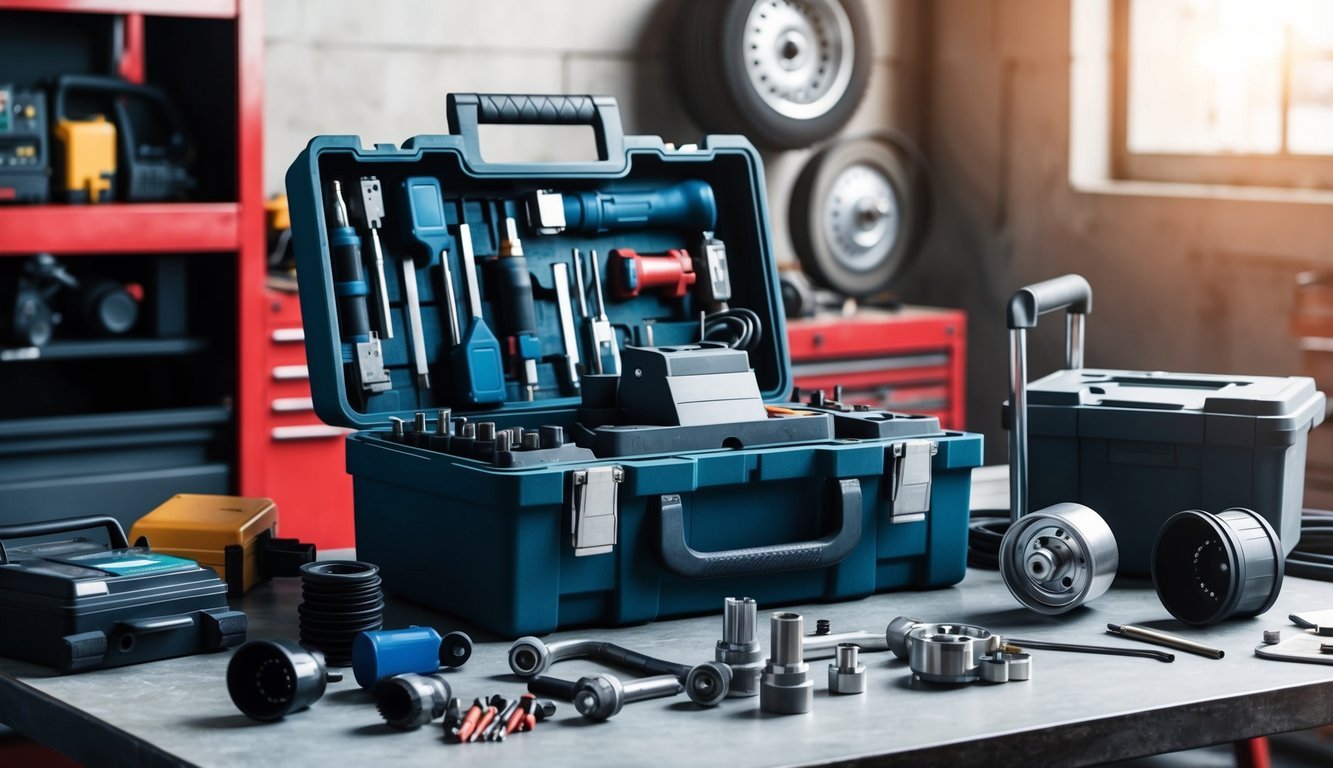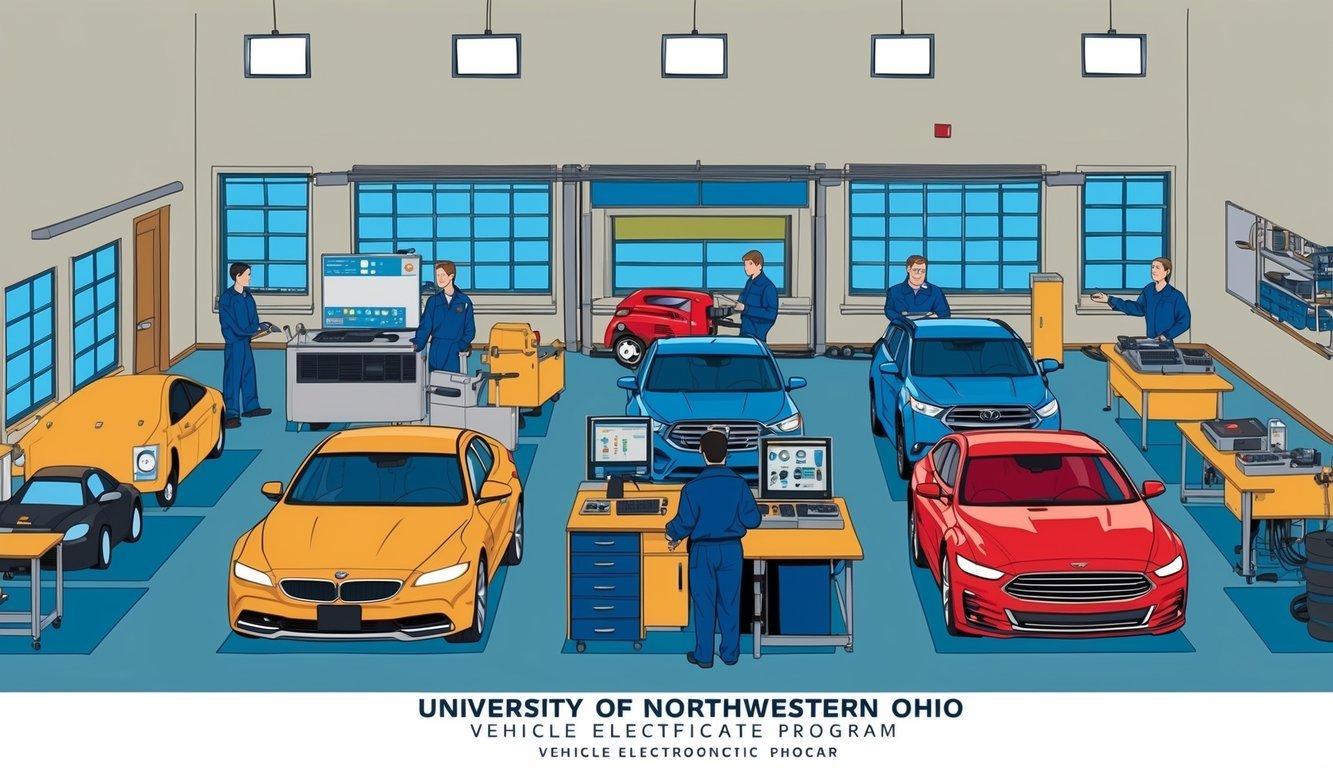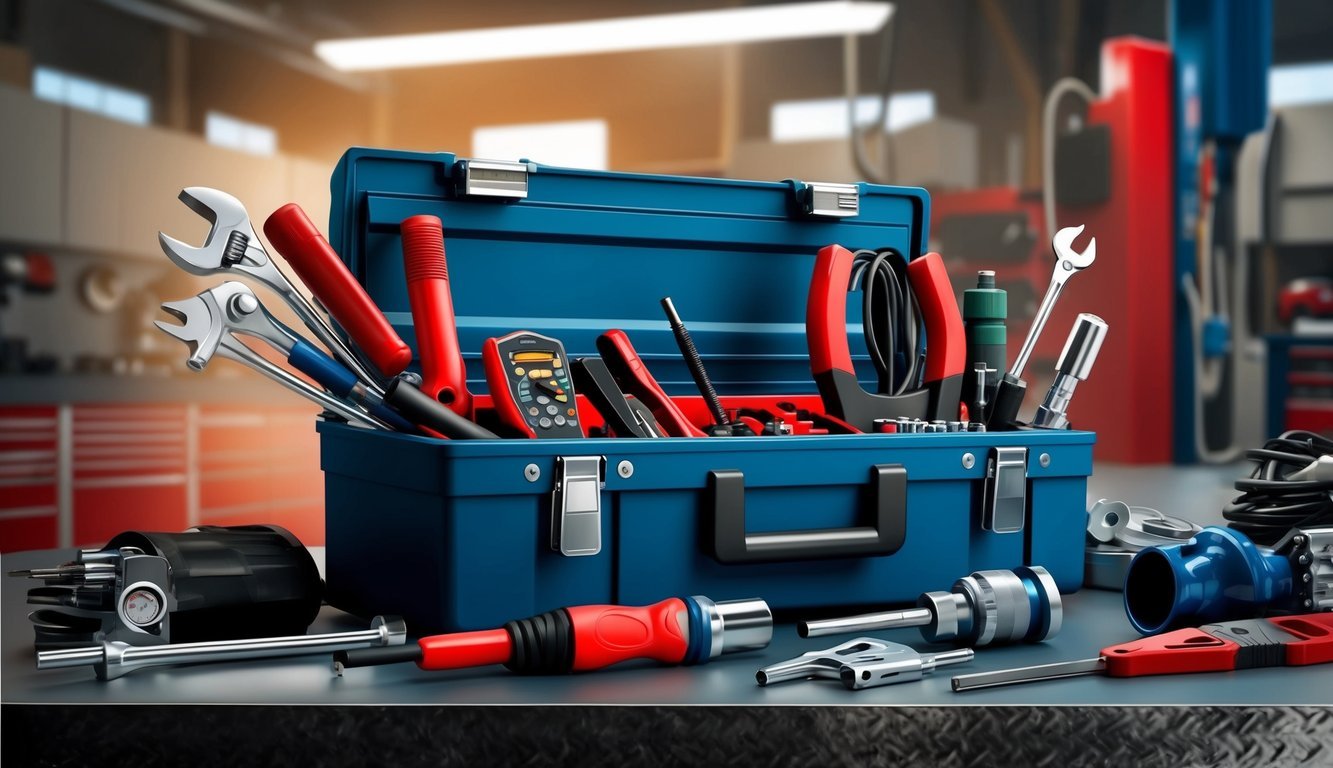Want to sharpen your car repair skills? Automotive diagnostic courses are the way to go.
These classes teach you how to spot and fix issues in today’s cars.
You’ll get hands-on experience with car computers, sensors, and all sorts of testing tools.

A solid diagnostic course can save you time and money on car repairs. Whether you’re just starting or have years under your belt, there’s always more to learn.
Let’s dive into some awesome options for automotive diagnostic training that cater to different skill levels and learning styles.
1) Auto Repair Technician Certificate at Universal Technical Institute
Thinking about kick-starting your career as an auto mechanic? Check out the Auto Repair Technician Certificate at Universal Technical Institute (UTI).
This program helps you get job-ready in less than a year!
At UTI, you’ll dive into hands-on training in state-of-the-art classrooms equipped with tools and tech from top manufacturers.
You’ll learn about everything from diagnostic systems to brakes, and fuel systems on both domestic and foreign cars.
The curriculum also covers power and performance, giving you a well-rounded skill set employers can’t resist.
And if you need housing or financial aid, UTI has got your back! Their dedicated teams are there to help you, and they offer career assistance to help you land a gig after graduation.
With UTI’s Auto Repair Technician Certificate, you’ll be well on your way to becoming a skilled automotive technician before you know it!
2) Advanced Automotive Diagnostics at Penn Foster College

If you want to improve your car repair skills, check out the online Auto Mechanic program at Penn Foster College.
This course dives into advanced diagnostic techniques for modern vehicles.
You’ll get hands-on with high-tech tools to uncover even the sneakiest engine problems.
They cover computerized systems in cars and how to fix them—perfect for both beginners and season pros looking to level up.
Plus, Penn Foster lets you study at your own pace.
You could finish up in as little as six months, and you don’t have to quit your day job to attend classes!
This program even preps you for ASE certification, which can give you an edge when hunting for jobs in auto shops or dealerships.
Just make sure to get some real-world practice while studying to truly apply what you learn.
3) Engine Performance Diagnostics at Ashworth College
Want to amp up your car repair game? Ashworth College offers an Automotive Engine Performance training that’s fab for anyone aiming to break into the automotive technician field.
You’ll dive deep into electronic fuel injection systems and how to diagnose problems with computer-controlled engines.
This course follows the guidelines set by the National Automotive Technicians Education Foundation (NATEF).
If you’re eyeing that ASE A8 Engine Performance certification, this program will help you prep.
By the end, you’ll have the skills that employers are really looking for.
The best part? You can study at your own pace from the comfort of home.
No need to quit your job or change up your busy schedule—just log in when it suits you!
4) Automotive Technology A.A.S. at Lincoln Tech

Looking to become a pro auto tech? Don’t miss out on the Automotive Technology Associate’s degree program at Lincoln Tech.
It’s the perfect path to learn the ins and outs of car repair and maintenance.
You’ll get hands-on training with real vehicles in their shop classrooms, covering everything from engines and brakes to electrical systems and computer diagnostics.
Lincoln Tech partners with brands like Chrysler and Mazda, giving you a ticket to more job opportunities when you graduate.
Oh, and you’ll also pick up some essential life skills, like time management and career planning, making you even more marketable.
5) Certified Automotive Diagnostics Specialist at Ferris State University
Want to level up your diagnostics skills? Check out the Automotive Service Technology program at Ferris State University.
This course is packed with hands-on learning to help you tackle the real-world challenges of auto repair.
You’ll learn how to utilize advanced diagnostic tools and how to determine what’s wrong with various vehicles.
You’ll also become adept at reading data to diagnose problems efficiently.
At Ferris State, you’ll work on actual cars in a modern shop, practicing with the same tools and tech you’ll encounter in your future job.
The curriculum spans everything from routine maintenance to troubleshooting complex system repairs.
By graduation, you’ll be all set to take on any car issue that comes your way, and that means job opportunities are practically endless!
6) Master Technician Academy by Snap-on

Want to boost your auto diagnostic skills? Snap-on’s Master Technician Academy just might be what you need.
The program offers a variety of courses to elevate your expertise.
You can even focus on Rotor Matching in a quick 15-hour class.
It’s a handy addition to your skill set.
How about learning about tire safety? The Tire Pressure Monitoring Systems course is another 15-hour gem that’s vital for today’s vehicles.
If you want to explore high-tech car features, look into the Advanced Driver Assistance Systems (ADAS) course.
This area is cutting-edge and crucial for modern cars.
Snap-on also offers a Mechanical and Electronic Torque course, which is quite a bit longer at 35 hours—but trust me, it covers essential skills for serious mechanics.
All in all, you can rack up to 165 hours of instruction with Snap-on’s academy.
It’s a great way to round out your abilities in diagnostics.
7) Vehicle Electronics Certificate at University of Northwestern Ohio

Craving to work with cutting-edge auto tech? Check out the Vehicle Electronics Certificate at the University of Northwestern Ohio.
This is perfect if you’re into all the latest car gadgets and gizmos.
You’ll learn about the electronic systems that make modern cars tick—everything from navigation to entertainment systems.
And the best part? You’ll get hands-on with real cars, not just staring at textbooks.
UNOH is known for its top-notch automotive programs, even being ranked #1 in the country for automotive tech—pretty impressive, right?
Completing this certificate doesn’t take long, which is perfect if you’re eager to kick off your career.
Plus, UNOH offers classes at different times, making it easy to fit your studies into your life.
Importance of Automotive Diagnostic Courses

Car technology is always changing.
Learning how to diagnose car issues helps mechanics stay ahead of the curve.
It’s crucial for fixing modern vehicles efficiently and accurately.
Enhancing Technical Skills
Diagnostic courses teach you how to handle the latest gadgets and software.
You’ll get hands-on practice with multimeters, test lights, and advanced diagnostic tools.
These skills make you the go-to person for solving tricky car problems.
You’ll also learn to read and understand error codes that help you pinpoint issues faster.
Understanding tech manuals and databases will be second nature.
Typically, these courses blend classroom learning with real workshop time, helping you grasp both the theory and practical sides of car diagnostics.
Keeping Up with Technological Advancements
Cars are becoming computers on wheels.
Diagnostic courses help you keep pace with all that new tech.
You’ll learn about the latest onboard diagnostic protocols.
You’ll also get familiar with new diagnostic software and how to reprogram car computers—essential skills for tackling today’s vehicles.
These courses keep you updated on the newest car systems, which keeps your skills fresh and relevant.
It’s like having a superpower for fixing the latest car models!
Choosing the Right Course

Picking the perfect automotive diagnostic course can seriously boost your career.
It’s important to consider a few key factors before you jump in.
Accreditation and Reputation
Make sure the course is accredited.
This means it meets quality standards.
Look for schools with a solid reputation in the auto industry.
Talk to local mechanics and shop owners—they usually know which courses are worth your time and money.
Their insights can be super helpful.
You can also read reviews from previous students to get the real scoop on course quality.
Course Content and Specializations
Take a close look at what each course covers.
Make sure it aligns with what you want to learn.
Some courses might focus on general diagnostics, while others specialize in particular car brands or systems. Make sure the course includes the latest diagnostic tools and software because the auto world moves quickly—you need skills that keep pace.
Hands-on practice is crucial, so look for courses that let you work with real cars and tools.
And remember, fixing cars isn’t just about following a checklist; it’s about being a problem solver!
Frequently Asked Questions

If you’re starting out in automotive diagnostics, you might have some questions.
Here are answers to some common ones about courses, training, and career prospects.
Where can I find high-quality automotive diagnostic courses online?
You can find some great online courses at places like Universal Technical Institute and Penn Foster College.
These programs teach you all about car diagnostics from the comfort of your home!
Are there any free resources available for learning car diagnostics?
You bet! You can kick off your learning journey without spending a dime with online courses on Unified Diagnostic Services basics.
Plus, many websites offer free videos and articles to help get you started.
What qualifications are necessary for a certification in automotive diagnostics?
Most certifications require a high school diploma or GED, along with completion of a training program and passing an exam.
Some schools like Ferris State University have specialized certification programs to help you out.
How much can I expect to earn as an automotive diagnostic technician?
Pay can vary based on your experience and where you live.
Entry-level techs might start around $30,000 annually, but with more skills and certifications, you could pull in over $60,000 a year!
Can you suggest automotive diagnostic training options located near me?
Check out Lincoln Tech for in-person training opportunities—they have campuses in many states! Local community colleges often have solid programs too, and you might even find nearby dealerships offering apprenticeships.
What are the essential steps involved in professional automotive diagnostics?
Here’s a quick rundown of the key steps:
- Talk to the customer about the issue.
- Inspect the car visually and go for a test drive.
- Use diagnostic tools to read error codes.
- Research the specific issue.
- Test components to pinpoint the problem.
- Fix the problem and ensure it’s solved.
Following these steps will help you tackle car problems accurately and swiftly!

